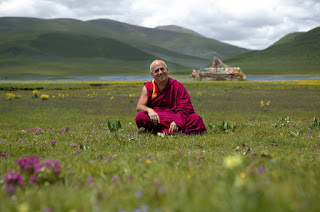I lived in London for 8 years before moving to the Shire. Most of it was spent with a normal job, until I decided that was overrated. Normal jobs give a "no need to decide" structure to days. The normal 5 days a week, and two-day weekend, loop. A physical place to go. Perhaps, new problems each day, but within a known category. My blog gives my days that structure now. Most days, that is the thing I know I will do. In the beginning, I used to keep a little log of ideas for blog posts. Gradually, it just became something I did automatically. Within themes. I carry on exploring, but the paths are less surprising. Perhaps I explore a new country, city, or language on Wikipedia, or learn aloud a little more about Universal Basic Income. Or I follow up on a conversation I have had with someone.
The "loopy place" I physically go is more flexible. In London, you can have a degree of anonymity. There are so many people and places, that I could find a little hidey hole and not be noticed. Places open. Places close. To get some recognisability to my loop, I went to my "Artist's Lunch" on Wednesday. Colleagues become the very human part of our loop. The idea of separating work and play is bizarre when we spend so much time at work. Leaving the normal working world meant, in a big part, leaving a group of friends. The Artists from the Wimbledon Art Studio which I was a part of for four years, became my point of consistency.
Now that I live in the Shire, I still venture back to that Artist's Lunch as often as I can. I like feeling part of something bigger. Even though each Artist is doing their own thing, it feels like you have a degree of 'shared mission'. Similar to separating work and play, separating Competing companies is also rather unnatural. Professional or Trade groups and associations remind people that we aren't defined by the company that we work for. They would do well to have Artist's Lunches.
A "Buhr" was a small fortification. A "ford" is a place that crosses a river. I live in a small medieval town called Burford. Slowly, this Donkey is becoming a local. The South African guy with long hair who is either walking, on his kindle, computer, phone, or playing with a Rubik's cube. As much a part of the furniture as Lady Diana and her mobility scooter. When you regularly cross the river, the river becomes a part of who you are, and you become part of the river.
We like to identify with the thoughts in our head. With our decisions. More and more, I believe our decisions are loopy. "Narrative Therapy" is a form of psychotherapy that helps people create stories about themselves that are helpful. It helps people by "Co-Authoring". You identify the characters, themes, and plots. The backstories, and events, that create the way we respond to the twists. Rather than autonomy over each fork in the road, it helps people step back and look at the road. It helps people identify their knowledge, skills, and values. Choose your road.
We like to identify with the thoughts in our head. With our decisions. More and more, I believe our decisions are loopy. "Narrative Therapy" is a form of psychotherapy that helps people create stories about themselves that are helpful. It helps people by "Co-Authoring". You identify the characters, themes, and plots. The backstories, and events, that create the way we respond to the twists. Rather than autonomy over each fork in the road, it helps people step back and look at the road. It helps people identify their knowledge, skills, and values. Choose your road.
To ensure we are focusing on the things that really matter. That we know the things we are becoming part of.


























